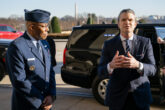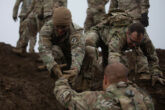July 13, 2020
The Pandemic and the Protests: Necessity and Perception of the National Guard
The coronavirus pandemic and the holistic societal approach that is required to get through this season demonstrates the value of the National Guard and the dual state and federal mission. To date, nearly 44,500 guardsmen have been activated in all 50 states, the District of Columbia, Guam, Puerto Rico, and the U.S. Virgin Islands in order to manage the COVID-19 crisis. While the sight of uniformed personnel in cities and towns unaccustomed to a military presence has caused fear and fueled rumors, the activation of guardsmen by governors is not unprecedented in times of crisis, nor even during public health emergencies. The Guard is often called upon to assist in hurricane relief, wildfires, and even prior outbreaks.
What Is the Role of the National Guard in the Pandemic?
Due to our nation’s system of federalism, which has been on full display during the coronavirus pandemic, governors play a huge role in determining what types of measures are taken in their states. The National Guard operates under a dual mission to support state needs and, when called upon by the federal government, national crises.
When responding to emergencies, the National Guard has an inherent advantage over active-duty troops performing the same duties.
The tasks the guardsmen are carrying out in the time of coronavirus have ranged between healthcare, logistics, and protection. The Florida National Guard has been testing for coronavirus alongside healthcare professionals in Jacksonville; the New York National Guard has provided transportation support on Long Island, the Guam National Guard have disinfected government offices to slow the spread, and the Massachusetts National Guard has stood security for homeless shelters. National Guard linguists in Washington State have translated public health directives into 12 different languages to make sure important updates reach populations that may be more susceptible to misinformation due to a language barrier.
Read the full article in Policy Perspectives.
More from CNAS
-
Hegseth Brings the Culture War to Combat
The fundamental challenge of military leadership lies in creating cohesive teams that can work together in an environment of mortal risk and, when called upon to do so, use le...
By Dr. Jason Dempsey
-
Hegseth Says Trump Boosted Military Recruiting. It’s Been Improving for over a Year
Defense Secretary Pete Hegseth says military recruiting has shot up since the Trump administration's return. In fact, it's been improving for at least a year, with big jumps i...
By Taren Sylvester
-
Pete Hegseth’s Views About Women and Military Standards
In recent weeks, Hegseth walked back comments made while promoting his book, where he said women did not belong in ground combat units. Without citing specific examples, he co...
By Katherine L. Kuzminski
-
What Trump’s Pick for Secretary of Defense Could Mean for Inclusivity in the Military
Dr. Kyleanne Hunter, Adjunct Senior Fellow with the Military, Veterans, and Society Program at CNAS joins to discuss the Trump administration nominee for secretary of defense....
By Dr. Kyleanne Hunter




